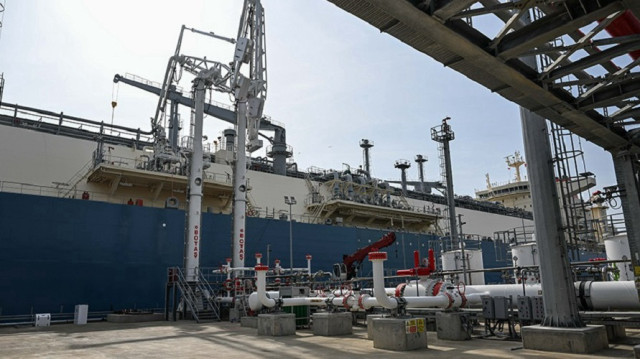
Land gas route through Syria to Türkiye's network offers a more practical solution that could encourage regional cooperation, says Karim Elgeny of Chatham House
- New energy landscape also creates opportunities beyond Syria's immediate neighbors, including Qatar and Saudi Arabia, Elgeny tells Anadolu
Türkiye has emerged as a key player in the Eastern Mediterranean energy landscape, driven by shifting regional dynamics in Syria, a leading expert highlights.
Karim Elgeny of Chatham House argued that the collapse of the decades-long Assad regime has opened new possibilities for regional restructuring. “Türkiye, with its extensive network of gas pipelines and LNG terminals, stands ready to become the region's energy hub as Syria's transformation is rewriting the Eastern Mediterranean's energy map,” he said.
According to Elgeny, Türkiye's existing energy infrastructure — including seven gas pipelines, five LNG terminals, three floating storage units, and two underground storage facilities — strongly supports its goal of becoming the region's energy hub.
Moreover, he noted, “The prospect of connecting to Syria's Arab Gas Pipeline network could offer regional producers more viable routes to European markets. The potential revival of the Qatar-Türkiye pipeline project could reshape regional energy flows.”
Elgeny also pointed to Türkiye's achievements in renewable energy, which now accounts for about 43% of its electricity production. He suggested that this could serve as a model for Syria's sustainable reconstruction.
- New energy opportunities
Discussing the evolving energy landscape, Elgeny pointed to broader regional opportunities beyond Syria's immediate neighbors.
“While Qatar and Saudi Arabia could revive their pipeline ambitions, countries like Egypt, Israel, and Lebanon could gain access to more cost-effective export routes. And Jordan's existing pipeline infrastructure makes it a natural partner in this emerging network,” he explained.
He said these developments present challenges to the Eastern Mediterranean Gas Forum's EastMed Pipeline project, strongly backed by Greece and the Greek Cypriot administration of Southern Cyprus.
Elgeny recalled that the EastMed project — a proposed 1,900-kilometer (1,180-mile) deep-water pipeline to transport regional energy resources to Europe via Greece and the Greek Cypriot administration — has already faced significant technical and financial hurdles. “A land route through Syria to Türkiye's network offers a more practical solution that could encourage regional cooperation despite existing maritime disputes,” he said.
- Türkiye's role in Syria's reconstruction
Beyond the regional shift contributing to Türkiye's position as regional energy hub, Elgeny emphasized Ankara's “natural leadership” in Syria's reconstruction, citing its long-standing regional engagement.
He cited the common points between the two countries, as well as the extensive experience Turkish construction companies have gained in rebuilding after devastating earthquakes in February 2023
“With its 900-km shared border and experience hosting 3.6 million Syrian refugees, Türkiye brings a unique understanding to the task. Fresh from managing large-scale reconstruction after the 2023 Kahramanmaras earthquake, Turkish companies are well-positioned to tackle Syria's estimated $400 billion rebuilding needs,” said Elgeny.
Hello, the comments you share on our site are a valuable resource for other users. Please respect other users and different opinions. Do not use rude, offensive, derogatory, or discriminatory language.
The floor is all yours.








